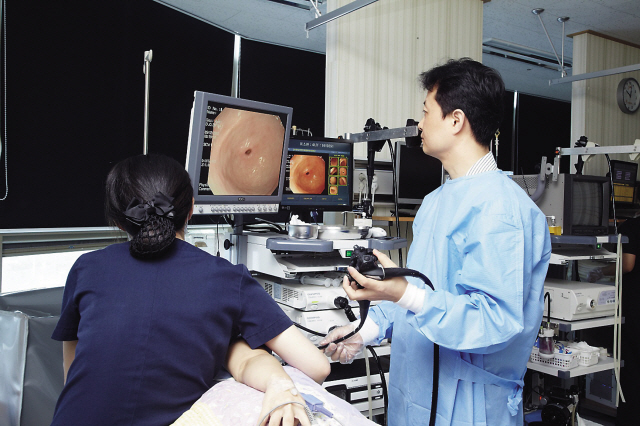Chuseok is over but has left many experiencing gastrointestinal problems such as digestive disturbance, abdominal pain, diarrhea, vomiting and heart burn.
Overeating, excessive drinking and late-night meals during the holidays are major causes for gastric problems.
Chuseok food, mostly oily and high in fat, can weaken the lower esophageal sphincter and causes acid and digestive enzymes from the stomach to flow backwards into the esophagus. Having meals late at night and going to sleep a few minutes after that can also cause heartburn and other symptoms. If it is not treated, it can permanently damage the esophagus.
Overeating, excessive drinking and late-night meals during the holidays are major causes for gastric problems.
Chuseok food, mostly oily and high in fat, can weaken the lower esophageal sphincter and causes acid and digestive enzymes from the stomach to flow backwards into the esophagus. Having meals late at night and going to sleep a few minutes after that can also cause heartburn and other symptoms. If it is not treated, it can permanently damage the esophagus.

However, food-poisoning and stress can also cause discomfort, doctors say. Many Korean women feel stress and tension when preparing food for families during Chuseok.
“The stomach is very sensitive to stress. The organs are controlled by automatic nerve system and they react instantly to one’s emotional responses such as stress, depression and anxiety. This can cause indigestion,” said Shin Eun-kyung, a doctor at the department of gastroenterology of On Hospital in Busan.
“Many take digestive medicine or painkillers to reduce stomach pain. But if that doesn’t work, patients should take fundamental treatment such as trying to reduce the level of stress,” said Shin Ji-hyun, a doctor at the mental health department of On Hospital.
Here are some tips that will help you to cope with gastric disorder, before taking pills.
● Skip a meal and drink water
● Don’t drink coffee or soda
● Don’t eat three hours before sleep
● Avoid fatty, spicy foods
By Cho Chung-un (christory@heraldcorp.com)
-
Articles by Korea Herald








![[KH Explains] No more 'Michael' at Kakao Games](http://res.heraldm.com/phpwas/restmb_idxmake.php?idx=644&simg=/content/image/2024/04/28/20240428050183_0.jpg&u=20240428180321)

![[Weekender] How DDP emerged as an icon of Seoul](http://res.heraldm.com/phpwas/restmb_idxmake.php?idx=644&simg=/content/image/2024/04/25/20240425050915_0.jpg&u=)








![[Herald Interview] Mistakes turn into blessings in street performance, director says](http://res.heraldm.com/phpwas/restmb_idxmake.php?idx=652&simg=/content/image/2024/04/28/20240428050150_0.jpg&u=20240428174656)
